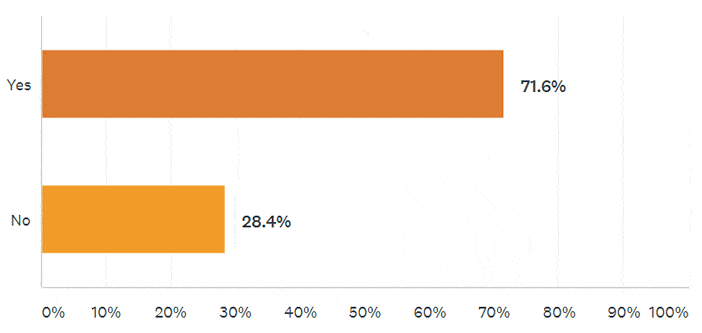Last month, the LANDTHINK Pulse posed the following question to our audience: Do you support work requirements for SNAP recipients being included in the 2018 Farm Bill?
July Pulse Sponsored By
Our informal online survey revealed that 71.6% of respondents staunchly support the Republican draft of the farm bill, which streamlines and increases work requirements on all able-bodied Supplemental Nutrition Assistance Program (SNAP) recipients without children. All able-bodied adults between the ages of 18 and 59 would be required to work or be enrolled in workforce training for at least 20 hours a week beginning in 2021. The House draft also includes mandates that SNAP recipients submit monthly proof that they’re complying with the work requirements.
The Farm Bill is a massive legislative package passed every five years that covers an array of programs including SNAP, crop subsidies, rural development, conservation, forestry, trade, energy as well as other miscellaneous programs. The food stamp program accounts for nearly 80% of farm bill spending. This year’s Farm Bill clocks in at 641 pages and would cost nearly $868 billion over 10 years. The current farm bill will expire on September 30, 2018.
For the majority of recipients, nothing will change; only work-capable individuals who choose not to participate in free training and education would lose their SNAP eligibility. Seniors and those who are mentally or physically disabled, would not be subject to the proposed work requirements. The Trump Administration’s goal of welfare reform is to help unemployed, able-bodied adults climb the economic ladder, crack down on fraud, close loopholes that foster a dependency lifestyle, and preserve resources for those that are truly in need of government assistance.
Many view stricter work requirements for SNAP as a key factor in breaking the poverty cycle. Most good Americans believe that it is the responsibility of the government to provide a social safety net to help individuals who fall on hard times get back on their feet, but also believe it’s critically important to arm them with skills and training to hold down a full-time job and improve their future. It’s a popular opinion that current welfare policies play a role in trapping generations of families in lifelong poverty, so advocates think it’s a good time for reform. U.S. unemployment is near record lows, and the booming economy is in desperate need of more workers.
The Farm Bill was originally created in 1933 as part of President Franklin D. Roosevelt’s Agricultural Adjustment Act, to address the needs of the poor as the country emerged from the Great Depression. The modern day SNAP program is doling out benefits to an ever-growing population, and is in need of a major overhaul. During the Obama Administration, food stamp rolls catapulted, in part because he softened the eligibility requirements. The Obama Administration implemented a policy that allowed states to seek waivers to welfare’s work requirements. Some states, notably Kansas and Maine, bucked the trend by rejecting the federal waivers and restoring work requirements. Both states saw the number of able-bodied adults on SNAP plummet by over 70%. Alabama and Georgia followed suit, and have also implemented SNAP reforms similar to those proposed in Farm Bill 2018 with utmost success.
It was the general consensus of the LANDTHINK audience (71.6%) that work requirements for SNAP should be included in the 2018 Farm Bill. Only 28.4% disagreed, opposing the changes to SNAP. Opponents argue that stricter work requirements would increase the paperwork burden for SNAP recipients, compounding financial stress, and put families at greater risk of food insecurity. Some say it would harm individuals just above the poverty line who are currently working at low-wage jobs but still depend on SNAP benefits to make ends meet.
Here are the final results:

- 71.6% support increased work requirements for SNAP in the 2018 Farm Bill
- 28.4% oppose increased work requirements for SNAP in the 2018 Farm Bill
Thank you to everyone who participated and shared the Pulse with friends and connections in the land industry. LANDTHINK would like to thank FARMFLIP for sponsoring the July Pulse. FARMFLIP is part of the LANDFLIP NETWORK and is devoted to farmland for sale including agricultural land, horse farms, mini farms, CRP farms and other income producing farmland.
Become a Pulse sponsor! It’s a great way to ensure your brokerage is the first one buyers and sellers call when they have a need to buy or sell property. You’ll get insane exposure on Social + Email + Web. That’s 500,000+ monthly eyes on you! Once you have it, you won’t want to give it up! Pulse sponsorships are offered on a first come first serve basis and are subject to certain limitations. If your business would be interested in sponsoring the September Pulse question, please contact us soon.
Do you have a suggestion for next month’s Pulse question? Submit your question and we might choose yours!
We want to know what you think about our August Pulse question, chosen and sponsored by United Country Real Estate: Within the next year, which region of the United States do you think will be the “hot spot” for investing in land? Answer now.
This content may not be used or reproduced in any manner whatsoever, in part or in whole, without written permission of LANDTHINK. Use of this content without permission is a violation of federal copyright law. The articles, posts, comments, opinions and information provided by LANDTHINK are for informational and research purposes only and DOES NOT substitute or coincide with the advice of an attorney, accountant, real estate broker or any other licensed real estate professional. LANDTHINK strongly advises visitors and readers to seek their own professional guidance and advice related to buying, investing in or selling real estate.







In regards to the above, yes, I support work requirements for adults on the SNAP program who are in a certain age group. When you reach a age group of 50+, finding a job can be almost impossible. That would be cruel to require someone of low income to seek a job in that age group.
I am 53 years old and have been disabled since 2007. I get a whopping $14.00 a month for food. I live in Arizona but I do believe this is a federal process. I used to live in Wisconsin back in 2011 and I got the maximum amount of $200.00. Go figure…I don’t make any different – I am low income but it seems someone looked at me and said, wow, her life sucks so let’s make it harder for her. Let’s give her $14.00 a month and see how she manages her very low monthly disability check. I worked at a Corporate job for many years before I got sick. I will never get better and quite frankly, I don’t care either way – I don’t get crap from Snap. I have seen many people buying soda, pizza’s, snack items, ice cream…I do not believe this program should allow this kind of “food” to be on the “allowed” list. It should be fruits, vegetables, milk, bread, cheese, etc. GOOD FOOD. Just my two cents…